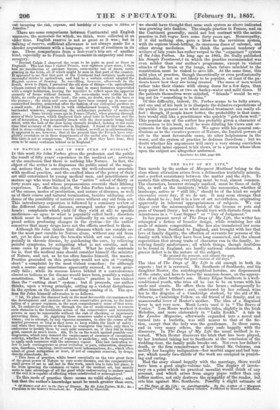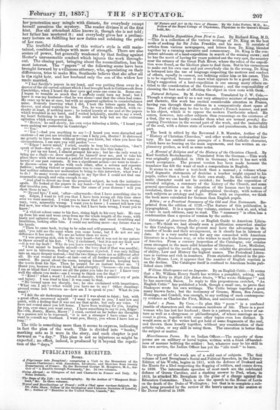THE DAYS OF MY LIFE. * TH.E novels by the author
of Margaret Maitland belong to the class whose attraction arises from a delineation truthfully minute, and a perfect consistency between the matter and the style. To sustain this attraction, everything must be real, almost common. The characters, however strongly marked, must be those of daily life, as well as the incidents ; while the accessories, whether of landscape, active or "still life," should be of the kind we might encounter every day, if we do not. It may seem strange that this should be so ; but it is a law of art nevertheless, originating apparently in inherent appropriateness of subjects. We can linger over the microscopical finish of the brooms or pots and pans of Gerard Douw; but we should turn with distaste from such minuteness in a "Last Supper" or "Day of Judgment."
In her present novel of The _Days of My Life, the writer has attempted a fiction of broader design, while retaining her old mode of minute composition. She has also transferred her scene of action from Scotland to England, and brought with her that love of family dignity, the affection of servants for persons of the family with which they have been long connected, and the almost superstition that strong traits of character run in the family, involving family misfortunes ; all which things, though doubtless to be found in England, are hardly national characteristics. A graver defect is in the nature of the subject.
" He_praised the present, and abused the past, Reversing the good custom of old days."
The idea of The Days of My life is old enough in both its aspects ; but it is reversed. Mr. Southcote of Southcote, and his daughter Hester, the autobiographical heroine, are dispossessed of the estate, and have to leave the mansion-house, on the appearance of an elder brother's son. Henry Edgar Southeote is a wellconditioned youth, who tries all he can to be on terms with his uncle and cousin. He offers them the house ; subsequently he offers himself to Hester ; and, undeterred by her refusal, wins her in the disguise of a Cambridge student, by the aid of Mr. Osborne, a Cambridge Fellow, arc old friend of the family, and an unsuccessful lover of Hester's mother. The idea of a disguised lover is not very new. Monk Lewis used it in "The Bravo of Venice." Tom Moore worked it double tides, slightly in the Irish Melodies, and more elaborately in " Lalla Rookh." A tale in the _London Magazine, afterwards expanded into a novel and turned into a burletta, was still nearer to that of the fiction, except that the lady won the gentleman. In these cases, and in very many others, the story ends happily with the discovery. In The Days of My Life the usual method is reversed. When Hester discovers the trick that has been played, by her husband taking her to Southeote at the conclusion of the wedding-tour, the family pride breaks out. Not even her father's death, or the firm remonstrance of her friend Mr. Osborne, can mollify her haughty indignation—her morbid anger and bad temper, Which nearly two-thirds of the work are occupied in punishing and curing.
Had the story closed happily with the marriage, there would have been a good single-volume tale. The display of inveteracy on a point which no practical moralist would think of any account, and which arises from angry pique rather than any loftier motive, not only destroys the sympathy of the reader, but sets him against Mrs. Southcote. Possibly a slight estimate of The .Days of Mg Life: as Autobiography. By the Author of "Margaret Maitland," ••Lilliesleaf," Be. In three volumes. Published by Hurst and Blackett.
her penetration may mingle with distaste, for everybody except herself perceives the mystery. The reader divines it at the first hint. Her old attendant Alice knows it, though she is not told; her father has mastered it ; and everybody gives her a preliminary lecture on fulfilling her new duties and subduing the pride of her race.
The truthful delineation of this writer's style is still maintained, combined perhaps with more of strength. There are also scenes of power, but generally weakened by that feeling against Hester's unreasonable conduct which injures the work throughout. The closing part, bringing about the reconciliation, has the most interest. The "papers" of the following scene have been brought forward by a villanous attorney, who, speculating on their differences, tries to make Mrs. Southcote believe that she after all is the right heir, and her husband only the B011 of the widow her uncle married.
"I had Saville's papers in my hand, and was putting them away in a drawer of the old carved cabinet which I had brought back to Cottiswoode from Cambridge, when I heard the door open 0d some one come in. Some one! I began to tremble so much that I scarcely could turn my. head; but I knew it was my husband—that he was alone—and that the crisis had come. He came up to me at once, but with no apparent agitation to counterbalance mine. Scarcely knowing what I did, I took the letters again from the drawer, and stood waiting for him. Yes, he was a little excited, with curiosity at least, if nothing more; he looked keenly at me and at the papers which trembled in my hand, and I waited helplessly, unable to say a word, any heart fluttering to my lips. He could not help but see the extreme agitation which overpowered me. " ' Hester,' he said slowly, his own voice faltering a little, I heard you were seeking me yesterday in Cambridge.'
"'Yes ?—had you anything to say ?—I heard you were disturbed and anxious—I see you are troubled now—can I help you, Hester ? It distressed me greatly to leave home without letting you blow, but when you hear the circumstances, I am sure you will pardon '— " 'Edgar ! never mind,' I cried, unable to bear his explanation, 'don't speak of that—don't—oh, pray don't speak to me like this today !
"I put up ray hand, I almost grasped his arm ; but he—he only went to bring me a chair—to draw another for himself near me, and to take his place there with what seemed a painful but serious preparation for some renewal of our past contests. It was a significant action—we were to treat— to discuss—even to advise with each other' after a solemn and separate fashion ; nothing violent or passionate was to come between us. B ut I, who had neither calmness nor moderation to bring to this interview, what was I to do ? So many words came rushing to my lips that I could not find one reasonable enough and calm enough to say.
"Mad _glad to divert me from the personal subject, he took the initiative again. He looked at the papers in my hand—' Is it some business-matter that troubles you, Hester—are these the cause of your distress ? will you show them to me ?
" Byand bye,' I said, after—afterwards—first I have something else to say. Edgar, I want to tell you that I have been wrong all this time since ever we were married. I want you to know that I feel I have been wrong, very, very, miserably wrong. I want you to know ; I cannot tell how you feel now, nor what is to happen to us, but I have been wrong, I want you to
"A violent colour came to his face, rising high to his very hair. He rose up from his seat and went away from me the whole length of the room, with hasty and agitated steps. As for me, I rose also, -and stood trembling and breathless, looking after him. I could say nothing more—my future was in his hands.
"Then he came back, trying to be calm and self-possessed. Hester,' he said, you told me the same when you came home, but I do not see any difference it has made. We are no 'better than we were.'
"1 WBS growing sick, sick to the very heart—but it was not in my nature to throw myself at his feet. 'Yes,' I exclaimed, 'but it is not my fault now —it is not my fault ! Why do you leave everything to me ? ' • • • "I had meant to humble myself—to the very dust if that was needful ; and now in bitterness, feeling any repentance rejected, I was only falling into an angry despair instead,—but the two things were not so different after all. He was roused at least—at last—out of all further poesibility. of selfcontrol. He paced about the room, keeping himself down, keeping back the words from his lips. Then he paused for an instant before me. I thank you, because you are kind,' he said abruptly ; because—do you think I am so blind that I cannot see all the pains you take for sue? I know very well the efforts you make—am I wrong to thank you for that ? ' "'Kind!' what a word ! I echoed it sharply, with a positive cry of pain and injury. I was kind to him! it was come to that. "He turned upon me sharply, too ; he also exclaimed with impatience, What can I say ?—what would you have me to say ? Other standingground seems lost between us—how am I to speak to you ? What do you want ? '
"I felt the air darkening round me as if I was about to faint ; but, with a great effort, recovered myself. 'I want to speak to you,' I said low and quick, with a feeling that it was not me that spoke, but only my voice. have not rested since you left home. I have been waiting for you, longing for you, ever since you went away. I have something to say to you, Edgar ! No—Oh, Harry, Harry, Harry !' I cried, carried on far before my thoughts by a passion not to be repressed 'it is not a stranger I have come to. I want to consult my husband. I want you, Harry, you whom I have lost so long!'" The title is something more than it seems to ex▪ press, indicating ff in fact the plan of the work. This is divided into "books," marking acts as it were in the story, and each chapter is put forward as "a day." This plan is not so injurious as might be expected; no effect, indeed, is produced by it beyondthe repetition of the "days."



























 Previous page
Previous page